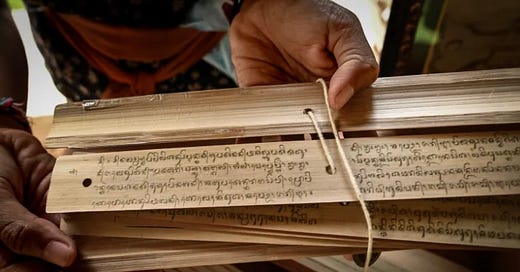Meeting Bali's Shamans
(Part 2) On the ancient palm book, the three types of human character, and all the ways of knowing
Hi friends,
Wishing you all a restorative Solstice, and much merriment and good cheer for your holidays.
I will be taking a couple of weeks off myself, and will be back in touch in the New Year with the usual Sunday entries and a new 2025 teaching calendar. I’m looking forward to getting back into teaching online after taking a year for, well, other things. Writing. Learning. Going quiet. Listening. Re-calibrating and refreshing my imagination. A year in the Australian bush has taught me more than I could ever have wished for. It looks like the tides are turning and a move is in the cards. But these gifts keep on giving. One day I will write about it.
Christmas Gift for you!!
For the festive season, I am offering three complimentary subscriptions to my full archive! To enter the giveaway, you can find the instructions on my Instagram.
You can also give gift subscriptions as Christmas presents to fellow lovers of myth, poetry and ancient things.
Thank you again for being here. As usual, if you enjoy this publication, it would mean the world if you clicked the like button, shared it, or posted it on your social media. It really does make a difference!
Now as promised, here is Part 2 of my interviews with three Balinese shamans.
Aside from becoming entirely enamoured by the equally intricate and simple principles of the Balinese philosophy, I was particularly excited (as I imagine you won’t be surprised) to learn of their ancient book where all knowledge is recorded and safe-kept in families, passed down through generations. This is how Balinese culture preserves itself.
When I interviewed the Spanish priest who married my parents, and who turned out to be the custodian of one of the oldest books in Europe, he showed me that the book documented all the folk traditions of medieval Spain meant to ensure a harmonious life. From what plants to use when we’re sick, to how to milk a cow, make wine, keep bees and build stables…
It was a repository of ancient knowledge.
In Bali, these books are called lontar. They are scrolls of palm leaf where all knowledge is recorded and passed down through families. And it is from these books that shamans-to-be learn the principles of their craft. If they have a living relative who holds the role of village shaman, they will also typically learn directly from them.
But there is another way, too. One that completely took me by surprise.
Keep reading with a 7-day free trial
Subscribe to Under a Fig Tree to keep reading this post and get 7 days of free access to the full post archives.




